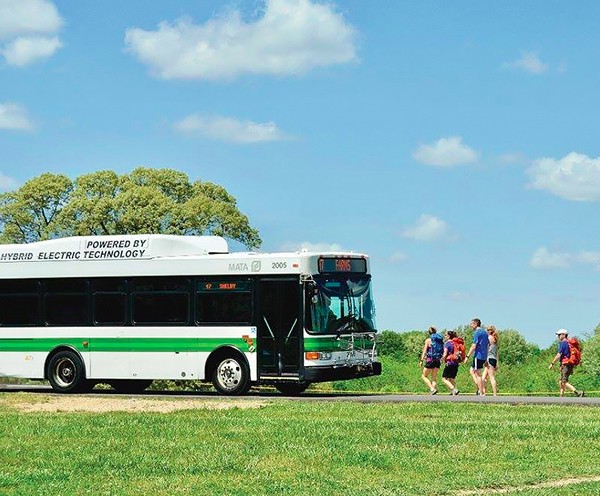 Memphis Area Transit Authority
Memphis Area Transit Authority
The Shelby County Commission spent most of Wednesday morning discussing how and why to invest in the Memphis Area Transit Authority (MATA).
Shelby County Mayor Lee Harris, who first began this conversation with the commission in September, along with leaders in the Memphis business community, discussed Wednesday how investing $10 million in transit would boost the economy here.
Harris has said that Shelby County has about 16,000 unfilled jobs and that his proposed $10 million investment would help Memphians get to those jobs, while having an economic impact of $40 million on the county.
Wednesday, Harris didn’t detail how exactly the projected $40 million impact was calculated. Instead, he and business leaders spoke broadly of the need for better transit in order to strengthen the business community here.
Beverly Robertson, president and CEO of the Greater Memphis Chamber, said last year the chamber did an UpSkill summit, aimed at preparing 10,000 residents for the workforce.
“But that is for naught if those folks don’t have adequate transportation to get to those jobs,” Robertson said.
Willie Gregory, director of global community impact for Nike, also spoke to the commission, saying that a more effective transit system is a “real need” for the community.
[pullquote-1]
“I want to affirm that a more effective transit system is a real need not only for the community, but for our basic business community,” Gregory said. “It’s an issue that we really need to figure out, and we don’t have much time to figure it out. As we attract more industries and businesses in Memphis, we have to have a plan to get our talent to jobs. It’s a right-now issue. It’s impacting real working families in our community who are trying to pay the bills, and businesses of all sizes trying to keep their doors open.”
FedEx executive Richard Smith said FedEx is the largest employer in Memphis, and investment in public transportation is vital to business and community growth. And “if done the right way,” he said, “has a proven return on investment on the community.”
Smith said last year FedEx held a recruitment event for 350 high school seniors from Shelby County. According to the recruiters, Smith said, nearly half of those students reported they would need to find a reliable way to get to work.
“Lack of transportation is the biggest challenge for these potential workers,” Smith said.
With more funding for transit, Smith said he hopes that MATA will work closely with FedEx to address the needs of its employees. For example, Smith said those working the night shift in FedEx hubs need a reliable way to get home when their shift ends at around 3 in the morning.
Jason Little, CEO and president of Baptist Memorial Health Care, said the hospital network has about 9,000 employees in Memphis, and, for many of them, transportation serves as a barrier. Based on a survey of employees, Little said it takes most employees using transit between two and three hours to get to and from work each day.
“They’re saving lives while spending three hours getting to work and three hours getting home from work,” Little said. “I just think we can do better. This is a real concern that Baptist certainly takes seriously.”
Little spoke specifically of one operating room employee, who he referred to as Ms. Lucy. Lucy has worked at Baptist for 45 years, Little said, and rides the bus every day.
“When she gets off at work at 4 o’clock, she waits an hour for the bus to come to Baptist at 5 so that she can begin her journey home,” Little said. “By the way, because what we do is life and death, we require our team members to be on time. When you work in the operating room, at times you get called in, even on weekends. There is a bus that runs to Baptist during the week, but not on Sundays. So when Ms. Lucy is called in on Sunday, she has to begin to scramble for other means.”
Members of the commission agreed that an investment in transit is necessary but disagreed over the mechanism to generate the funds.
As of now, there are two options on the table: Harris’ proposal of a $145 vehicle registration fee for each household’s third car and beyond and the resolution brought by three commissioners to increase the countywide wheel tax by $20.
[pullquote-2]
Some commissioners were wary about an increased wheel tax.
One of the concerns was the cap on funds going to MATA. Per the resolution, any funds collected that exceed $9 million would go to the county’s general fund. Commissioner Amber Mills suggested that there be no cap on the funds allocated to MATA, but the commission voted that amendment down. Earlier in the discussion, Commissioner Edmund Ford Jr. expressed concerns on behalf of his constituents about the excess money, saying it would be added to a “county slush fund.” Ford said he can’t support the resolution “the way it is written.”
Another concern voiced by the commission is the ambiguity around the amount of revenue this increased wheel tax would produce and what MATA would use the additional funds for.
Gary Rosenfeld, president and CEO of MATA, briefly addressed the latter concern, saying the funds would first be used to address issues such as MATA’s bus driver shortage and facility improvement needs.
The commission moved to exclude residents making under $30,000 from the $20 increase, based on a recommendation by Commissioner Tami Sawyer, one of the resolution’s three sponsors.
The amended resolution will move to the full commission meeting on Monday with a favorable recommendation. Per state law, the resolution would need to receive a two-thirds majority vote to pass.